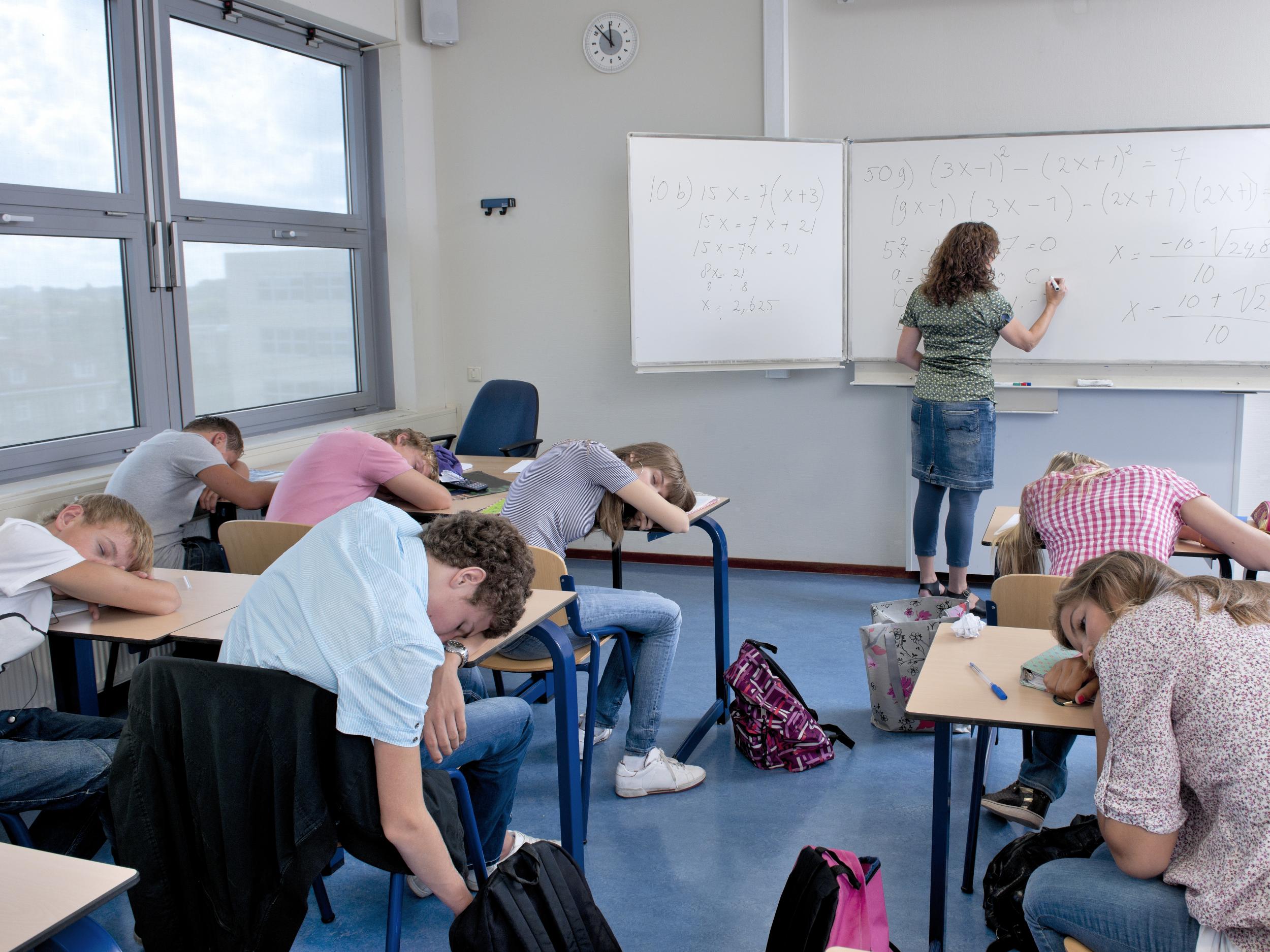Starting school at 10am halves student illness and improves academic performance, finds study
Significant results are latest evidence later start times provide major health benefits to teenagers

Your support helps us to tell the story
From reproductive rights to climate change to Big Tech, The Independent is on the ground when the story is developing. Whether it's investigating the financials of Elon Musk's pro-Trump PAC or producing our latest documentary, 'The A Word', which shines a light on the American women fighting for reproductive rights, we know how important it is to parse out the facts from the messaging.
At such a critical moment in US history, we need reporters on the ground. Your donation allows us to keep sending journalists to speak to both sides of the story.
The Independent is trusted by Americans across the entire political spectrum. And unlike many other quality news outlets, we choose not to lock Americans out of our reporting and analysis with paywalls. We believe quality journalism should be available to everyone, paid for by those who can afford it.
Your support makes all the difference.A new study has shown delaying school start times for teenagers can have major benefits, including better academic performance and improved mental and physical health.
When students in their mid-teens started school at 10am instead of the usual 8:30am, rates of illness decreased by more than half over a two-year period, and got significantly better grades.
The long-term study, which was carried out in an English state school, demonstrated the huge health impact that early start times and more sleep can have on teenagers.
“The big issue about school times is health,” said Dr Paul Kelley of the Open University, the lead author of this new paper. “It starts with physical illness, and then there’s mental illness, and last but not least academic performance.”
According to Dr Kelley, conditions as diverse as obesity and depression have been linked with excessively early school times and lack of sleep, and a growing body of evidence is giving calls for change real scientific clout
“There is an increasing amount of research coming out showing similar effects from around the world,” said Dr Guy Meadows, who is co-founder of The Sleep School and was not involved in the study.
He noted that British schoolchildren are the sixth most sleep-deprived in the world, with American children topping the rankings.
Earlier this year, the American Academy of Sleep Medicine issued a position statement declaring that “delaying school start times positively impacts student achievement, health and safety”.
They have joined other major US organisations such as the American Medical Association in calling on all schools to implement start times of at least 8:30am. As it stands, many schools in the US currently start as early as 7am.
But the new Frontiers in Human Neuroscience study, led by Dr Kelley, suggests that schools need to start considerably later if the full health benefits are to be realised.
“Ten isn’t a magic number,” he said. “The time shift gets progressively later, for biological reasons, from the onset of puberty.”
Previous work by Dr Kelley and his collaborators with university students suggested that by the age of 18, academic performance would be optimised if teaching began as late as 11am or even noon.
“And that’s also going to be relevant for work, because not everyone aged 18 and 19 is in university,” said Dr Kelley.
Biological factors mean that teenagers have different sleep requirements compared to older people.
Adults might only require seven hours of sleep, but according to a TED talk given by neuroscientist Professor Russell Foster of the University of Oxford, teenagers “need nine hours for full brain performance.”
“Many of them, on a school night, are only getting five hours of sleep,” said Professor Foster. “It's simply not enough.”
As we go through puberty, the circadian rhythms that control the daily cycle of our bodies become delayed by a couple of hours. The release of melatonin, a chemical in the brain that governs sleep, occurs later, meaning that teenagers have a natural tendency to go to bed later than their parents.
This, combined with the higher sleep requirement for teenagers, results in widespread sleep deprivation.
Further complications come from individual variation in sleep requirements, or ‘chronotypes’, with everyone possessing different circadian rhythms. Some are ‘larks’ who like to rise early, and some are ‘owls’ who prefer to stay up late.
Dr Meadows said that recognition of individual sleep requirements was growing, with workplaces increasingly likely to offer flexible hours based on their staff’s needs.
“The world is recognising that individual circadian timing is important,” he said.
As for schools, Dr Kelley thinks it is vital that the world recognises the issue and pressure is applied to encourage schools to make significant changes to their schedules.
“Students themselves, and their parents, should realise that there is a problem,” he said.
“This is a big issue that isn’t just about sleep, but circadian rhythms, chronotypes and the mistiming of our society."
Join our commenting forum
Join thought-provoking conversations, follow other Independent readers and see their replies
Comments